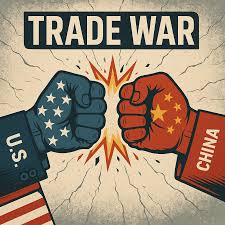📣 Overvie

w: Trump’s "Tariff Bomb" Declaration
In early April 2025, former U.S. President and Republican frontrunner Donald Trump declared that if re-elected, he would impose up to 60% tariffs on all imports from "unfriendly nations."
He specifically pointed to China, South Korea, Germany, and Mexico, blaming them for "killing American industry," particularly in automobiles, steel, and electronics.
While it may seem like a campaign tactic, Trump has a precedent: his 2018–2019 trade wars were real.
This time, his remarks have again sent shockwaves through the global economy and South Korea’s export-heavy industries.
🌍 Current Tariff Status and National Responses
| China | Up to 125% | Imposed retaliatory tariffs (125%), suspended U.S. agricultural imports, restricted rare earth exports |
| Germany | 25% (autos, etc.) | EU planning WTO complaint and countermeasures |
| Mexico | 25% (various industries) | Considering retaliatory tariffs on U.S. goods |
| Japan | 24% (mainly automobiles) | Sent diplomatic delegation and requested tariff reconsideration |
| South Korea | 25% (automobiles, etc.) | Announced emergency support measures for exporters |
| UK | 10% (all items) | Seeking resolution via negotiation |
| France | 10% | Engaging in EU-wide coordination |
| India | 15% (select sectors) | Requested restart of U.S.-India trade talks |
| Italy | 20% (auto parts, fashion) | Joining EU-led response strategy |
| Canada | 10–25% | Retaliatory tariffs on selected U.S. goods already implemented |
🚘 Korean Companies React: Crisis Management Activated
Trump’s comments hit Korea’s auto industry particularly hard.
With heavy reliance on exports to the U.S., companies like Hyundai, Kia, and POSCO have taken immediate steps to brace for impact.
💡 Key Company

Strategies
| Hyundai Motor | Launched a “price freeze” program in the U.S. until June to reassure customers |
| Kia Motors | Exploring rerouting exports via its Mexico factory |
| Samsung Electronics | Expanding manufacturing in Mexico to reduce reliance on U.S. imports |
| LG Electronics | Localizing production of high-value appliances in Mexico (Reynosa, Monterrey, etc.) |
| POSCO | Scaling up U.S.-based production to bypass tariffs |
| LG Energy Solution | Expediting operations at battery plants in Canada to secure IRA compliance |
| EcoPro BM | Reinforcing North American presence and battery material supply chains |
🧭 South Korean Government Response
South Korea responded promptly with emergency measures:
- Injecting ₩9 trillion (~$6.7 billion) in export financing
- Expanding tax incentives and subsidies for key industries
- Strengthening trade diplomacy with U.S. Congress and the USTR
- Supporting relocation to third-country production sites like Mexico and Eastern Europe
Officials emphasized a “scenario-based response” strategy, with ongoing risk assessment by sector.
🔚 Conclusion
Trump’s tariff threat isn’t just campaign rhetoric—it exposes Korea’s structural vulnerabilities:
an over-reliance on exports, dependence on a few major markets, and supply chain fragility.
Now is the time for strategic diversification, domestic demand reinforcement, and industrial upgrading.
Trade wars aren’t won by the loudest voice—but by the best-prepared player.
📌 Hashtags
#TrumpTariffs #RetaliationTariffs #TradeWar #KoreaExportRisk #HyundaiResponse #SamsungStrategy #LGESolution #ExportFinance #SupplyChainShift #AprilIssues
'경제' 카테고리의 다른 글
| 상하이 모터쇼, 전고체 배터리 시대 개막! 한국·일본·중국 '차세대 전쟁' 본격 돌입 (1) | 2025.05.01 |
|---|---|
| 일본 엔화, 34년 만에 최저! 아시아 경제 판도가 바뀌고 있다 (2) | 2025.04.30 |
| 인공지능(AI)의 사회적 영향과 대응 방안 – 기술이 아닌 삶의 문제 (0) | 2025.04.02 |
| Cryptocurrency market outlook for 2024 (0) | 2024.03.02 |
| 2024년 암호화폐 시장 전망 (2) | 2024.03.02 |




댓글